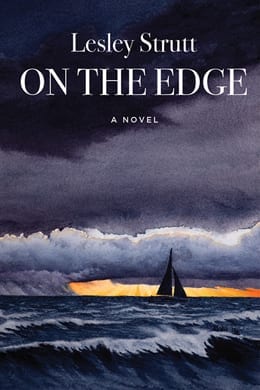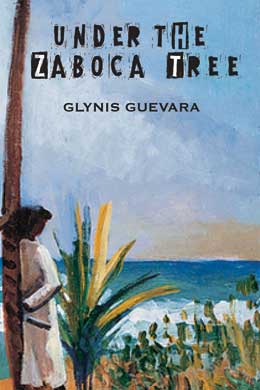-
Macedonian rights sold to Prozart Media, Skopje, Macedonia
On the Edge tells the story of Emerald Lake Visser, an unhappy fourteen-year-old who came to live on her aunt and uncle’s farm when she was orphaned at age five. A misfit in her community and at school, her only real friend is an elderly woman, Jess, who teaches her to sail. Emma’s a natural sailor, as if she’s been on a sailboat her whole life. When Jess dies, it’s revealed that she was Emma’s grandmother. After receiving a letter that her mother may be living in the Bahamas, Emma runs away on her grandmother’s boat, the Edge, to find her. Disguising herself as a boy, Emma sails the Edge through the Erie Canal, down the Hudson River, out onto the Atlantic Ocean and through the ICW to Miami, where she crosses the Gulf Stream to the Bahamas. Navigational mistakes, near misses with the coast guard, a robbery, and storms put Emma in danger time and again. To add to her stress, by the time she reaches New York City she suspects she’s being followed. She notices small black pebbles appearing on her boat, along with dirty footprints in her cockpit. When a handwritten note is tucked into her porthole, she becomes very frightened. She has no passport and is underage. If she’s caught, she’ll be sent back to the farm. But Emma is determined to find her mother.
“A daring escape, a mystery to solve. A yar boat and a girl who can sail her. High seas and high adventure — what more could you want? On the Edge is a rollicking good read.”
—Tim Wynne-Jones, two-time winner of the Governor General’s Award
“A magical adventure story following Emma, a fourteen-year-old orphan as she navigates the waters from Canada to the Bahamas in search of her mother. Here is a fearless and resilient hero, sure to strike a chord with readers the world over. On the Edge captures the freedom of sailing and the unbreakable bonds of family in a tale of singular beauty.”
—Gail Benick, author of The Girl Who Was Born That Way
“Fourteen year old Emerald Lake is a captivating heroine: an orphan with a mysterious past, a born sailor on a quest, an indomitable adventurer with a passion for the truth. The author’s time at sea shows in the reams of authentic detail throughout this page-turning nautical adventure. By the time I was done I felt like I too could sail single-handed from Kingston to the Bahamas!”
—Ursula Pflug, author of Motion Sickness and Mountain
Lesley Strutt is a prize-winning poet, playwright, essayist, and a blogger, with a PhD in Linguistics from McGill University in Montreal. She is the descendant of William Pittman Lett, a pre-confederation poet who was known as the Bard of Bytown before Bytown was named Ottawa in 1854. In 2002-2003, she sailed a 32-foor Hunter from Lake Ontario to the Turks and Caicos, then spent the winter sailing around all the islands in the Bahamas. Her debut collection of poetry, Window Ledge, is forthcoming from Inanna Publications in 2020. She lives in Merrickville, Ontario.
The police will soon begin to wonder what happened and determine how far they should search. When no trace of Emma and the Edge is found on the Canadian shores, it’s possible they’ll start State-side.
Would someone link Emma with a random boy out sailing for the day? If anyone has noticed, would they make the connection? The Edge isn’t your typical sailboat. What if they hand out a good enough description…?
Emma’s breath hitches as fear rears its ugly head. If they find her….
Emma finally gets it. She gets the enormity of what she has done. She can never go back. Never, as long as she lives. She’ll never see her aunt and uncle again. She’ll be punished and … it would destroy her. No. She’ll never go back.
The rain pelts down hard. Emma tries to go back to sleep but the violent rocking and the howling keep her awake. Her nightmare hovers in the dark waiting for her. The storm. Her mother shouting for her father. She pushes the monster back down, slams the door on it.
But she can’t shake the feeling that something will happen any minute and she goes over and over in her mind that she’s safe. There’s nothing to do but wait out this storm that slashes around her.
There’s a sudden crash against the hull.
“Aack!” Emma races to the porthole to peer out. She sees a large branch sweep by swirling and whipping past. She huddles back down in the berth. She clutches Jess’s goofy cat-shaped pillow against her chest.
“I’m safe. I’m safe,” she says over and over. She abandons all effort to get back to sleep and flicks on a light.
She can see signs of Jess’s presence everywhere. She snuggles deep under the colourful wool blanket Jess knitted. Wedged securely in small spaces all over the boat are Jess’s books and mementos: a piece of driftwood that looks like a frog, dried seedpods stuffed in a tiny wooden vase.
Emma remembers the plain white bed in her plain white bedroom back at the farm.
“Everything works better if it’s clean and neat! Everything has to be in its place!” Aunt Petra would yell as if Emma was deaf. But it didn’t work that way for Emma. There were so many rules for her to break, and it seemed that just when she figured some out, new ones got added.
So here she is, in Jess’s boat. No, it’s her boat, now. To distract herself, Emma pulls down one of Jess’s books on sea legends. She opens it and a piece of paper drifts to the floor. She leans down and picks it up. It’s an old photo. Dog-eared, very worn. Her hand trembles as she studies it.
There’s Jess, looking much younger than Emma ever remembers seeing her. There’s a pretty young woman with long hair. And a child. The child’s clutching the woman’s hand and leaning against Jess. Emma studies the photo carefully. She turns it over. The words “Emma, Peggy and me” are written on the back.
Emma’s heart starts hammering in her chest. She’s never seen a photo of herself as a child. Never seen what her mother looks like. So, this woman is her mother. They were together. Of course, it makes sense. But together with Jess? How could Emma have met Jess and not remembered? This must have been what Jess meant about the last time they were together. Before she was brought to live with her aunt and uncle.
More unanswerable questions start to swarm into her head. Tears well up and she wants to scream out her frustration. Instead she squeezes her eyes shut, listens to the rain rattling on the deck above her head.
After a while she gets up and pulls out the letter Jess left her, reads the newspaper clipping again. As she reads, she fingers the small purple stone Jess gave her on her thirteenth birthday. At last she can wear it openly. At least at night when other boaters won’t see. She could never wear it at the farm and had kept it carefully hidden from her aunt. Amethyst, Jess had said. A stone for dreaming. She reads again how her mother was last seen in Mayaguana before she disappeared. When Emma had looked it up in the school library, she’d discovered it was the last inhabited island of the Bahamas archipelago that stretches 1500 miles out into the Atlantic Ocean. How will she ever make it there? The trip seems so daunting. Overwhelming. What makes her think she can do this? Here she is cowering while she’s pummeled by a storm and she’s only on a measly river.
Her thoughts drift back to Jess, their random meeting. It was Jess who convinced her to go back to the farm with the promise she could return to visit her anytime. What if it wasn’t such a random meeting after all?
Why didn’t Jess ever tell her she was her granddaughter? What stopped her from saying anything? Something feels all wrong. A jittery thought creeps into her mind that Jess and Aunt Petra and Uncle Derek had all agreed to keep her in the dark. That Aunt Petra must have known she was visiting her grandmother, and that it was okay as long as Jess didn’t say anything. As long as all she did was treat her like any ordinary visitor.
It was Jess who showed Emma that a home could be lovely, and that it could include colour and messiness, stones and driftwood collected from the beach, reclaimed wool in baskets ready for knitting into sweaters, and books piled everywhere. And a sweet old cat who leaves hairs on the couch.
“Whiskers!” Emma sits bolt upright, appalled that she hasn’t given Jess’s cat a thought until now. “What happened to Whiskers?”
She throws off the blanket in a rush, reaching for her hoodie, her jeans.
“STOP!” She’s bare-footed, standing in the centre of the cabin.
“What am I doing?” She holds the jeans in one hand, her sweatshirt in the other, out in front of her as if to ask how they got into her hands.
“What am I doing!” she yells at the storm. The agitation that spurred her out of the berth drains out of her and she’s limp with a kind of confusion that makes her head spin.
“Who looked after Jess’s cat? Who organized Jess’s funeral?” Emma’s head begins to ache again. It drives her crazy that she doesn’t have answers to the questions whirling inside her. She crawls back into her cozy berth and covers herself with the blanket again.
The hours continue their slow passage.
“I’m truly alone.” The thought threatens to swamp her, and her heart sinks like a stone. But as soon as that sinking starts, she has another thought. A startling thought. It comes out of nowhere, like a quiet calm voice deep inside of her, buoying her up like a life jacket.
And that other thought is this: What if I’m part of everything around me? What if I’m part of the birds that are sheltering from the storm, and the black night sky, and this wind that’s howling, and the water I’m floating on, and the trees on the shore? Maybe Jess is part of everything too. Even now. What if she’s right here with me on this adventure?
She has no clue where the thought comes from. And it’s followed just as freshly by another one: What if everything that is happening is happening for a reason?
Emma takes one of the deep breaths that have helped calm her in the past.
I ran away because there is something I need to do. And that thing is this: I need to find out what happened to my mother.
And with that last thought, something inside of Emma stops and becomes very still. It’s as if Jess has reached out and put a hand on her shoulder and said, YES!









Renée Knapp –
On the Edge by Lesley Strutt
reviewed by Leslie Vermeer
Resource Links Vol 25, No.1 – October 2019
Excerpt:
This novel is a solid selection for readers who enjoy sports stories and anyone who feels like an outsider in their own life. The illustrations interspersed with the telling add a soft touch and make Emma’s observations more accessible for those who have never been on a sailboat. Let Emma and the Edge carry you away!
Thematic Links: Family; Secrets; Sailing; Inheritance; Independence; Self-Reliance
Renée Knapp –
On the Edge by Lesley Strutt
reviewed by Chastity Findlay
CM: Canadian Review of Materials Volume XXVI / Issue 10 – November 2019
https://www.cmreviews.ca/node/1203
Grades: Grades 9 and up
Ages: Ages 14 and up
Excerpt:
In spite of the rain her spirits are high. She whistles a silly tune as she returns from her outing. And there, wedged into the locked hatch cover, is a folded piece of paper. She pulls the paper out and unfolds it. Another black pebble just like the other three falls out.
“You’re doing great. Take care,” the note says. A shiver passes through her. With the piece of paper clutched tightly in her fist, Emma studies the boats nearby to see if anyone meets her eye or looks suspicious.
Who’s watching her? Where are they? What’s going on?
She quickly unlocks the hatch and stows her purchases below. Then she casts off and motors away from the crowded dock all the while peering over her shoulder for signs that someone is watching or following her, but no one moves on any of the boats. No one that she can see, at least.
When she’s out of sight of the town dock and away from the houses that line the shore, she drops her anchor. She feels safer out here, away from people. But why should she? Why is it safer here? She doesn’t know the answer. She just knows what she feels.
From her hiding place in the shadow of a huge cypress tree she watches the water for any approaching boats. The dripping branches hang down to the water and the tree’s roots extend like dozens of bony fingers into the mud. Anyone coming close will have to push past the cavern of the tree. The rain pelts down and Emma huddles inside on the bench, her arms wrapped around her knees. She goes over in her head what just happened.
Another pebble. And now a note. Why leave a note? It must be because whoever it is wants her to know for certain that she’s being watched, followed.
Followed! Followed! The words churn around in her head. This is insane! Nuts! Anger boils up inside her. She was so proud of her disguise, her escape, and now she realizes she hasn’t escaped. Her disguise didn’t fool this person, whoever it is. Panic rises up in her throat. And swiftly anger flashes through her again like a roaring flame. It burns itself out in a few seconds leaving behind a kind of blank stillness.
Four black pebbles and a note giving her a compliment. She’s doing great. Emma considers her reaction. Has she been so paranoid about getting away that she considers only the sinister, only the threatening side of everything that happens?
She lets the question sink in. What if this person is an ally? A friend? But who could it possibly be?
Emma Visser has lived a very structured and secluded life on her aunt and uncle’s farm for the past nine years since becoming an orphan at age five. Her life before that mostly remains a mystery, save for a few memories that come to her in her dreams and nightmares. Her only form of escape from the abuse her aunt subjects her to is sneaking away from the farm to learn to sail with her elderly friend, Jess.
Emma’s life, as she knows it, takes a drastic turn when she learns that Jess is actually her grandmother and has left her beloved sailboat, The Edge, her house, and an inheritance to Emma upon her passing. Emma also receives a letter from her grandmother and a mysterious newspaper clipping that seems to point to her mother’s being alive and well in the Bahamas. Upon learning this information, Emma feels compelled to set sail on The Edge to find her mother and discover more about her past. Her only other alternative is to return to her abusive aunt who is trying to sell the sailboat out from under her.
The 14-year-old sets sail, dodging customs officials, facing navigational errors, a robbery, fatigue, and sabotage on her boat whilst trying to avoid curious sailors who may question why she is out on her own in foreign waters. To make matters worse, she begins to suspect that she’s being followed, finding evidence such as muddy footprints, small black pebbles placed on her boat, and a note. Despite these roadblocks, the resilient young girl remains undeterred as she continues her quest to find her mother.
This book is author Lesley Strutt’s most recent young adult novel. Strutt is a published poet, playwright, essayist, and blogger. Her poetry collection, Window Ledge, is set to be released by Inanna Publications in 2020. She holds a PhD in Linguistics from McGill University. Her love of storytelling flourished by growing up in a world filled with storytelling and space to foster her imagination. She is an experienced sailor, having sailed from Lake Ontario to the Turks and Caicos in 2002 and 2003, spending several months sailing around the Bahamian islands.
On the Edge is part of Inanna Publications’ young feminist series which showcases the experiences of diverse Canadian women. The book’s protagonist, Emma, certainly fits the bill. She is a character that readers are likely to relate to and be inspired by. Navigating a boat from Canada to the Bahamas is no small feat, but the resilient teen handles herself with grace and an unwavering spirit, persevering despite the many adversaries she faces. An adventure text with a strong female lead is a refreshing, and much needed addition to the genre, and readers in the target audience are likely to enjoy and appreciate the novel.
As Emma sets sail, the author creates vivid imagery that brings the journey to life for the reader. The setting of this text is particularly important to the reader’s experience of the major plot events, and Strutt does it justice through pairing descriptive imagery and figurative language with stunning illustrations. The colourful illustrations are part of the text, itself, as Emma creates a visual diary of her travels. The detailed description and illustrations of the various settings that Emma passes through, most likely inspired by the author’s own journey, create an accurate and striking experience for the reader.
On the Edge is a well-developed tale in which thriller, adventure, and coming-of-age genres collide. The suspenseful aspects are well-balanced with the main character’s literal and metaphorical journey of self-discovery. The book speaks to many important topics of interest relevant to teens, such as family, friendships, conflict, survival, identity, feminism, and resilience. I believe that this book would be a relevant and appreciated read for those in the target audience, particularly girls who can relate to or may become inspired by the protagonist’s resilient spirit.
Highly Recommended
Renée Knapp –
On the Edge by Lesley Strutt
reviewed by The Miramichi Reader – January 5, 2020
https://miramichireader.ca/2020/01/on-the-edge-review/
Ontario author Lesley Strutt’s novel On the Edge is part of Inanna Publication’s Young Feminist Series, and is an adventurous read for all ages, especially for those who like sailing stories. Fourteen-year-old Emma (short for Emerald) is living an overly-restrictive life on her Aunt and Uncle’s farm near Kingston, Ontario. For mysterious reasons. her mother handed over care of her to them when Emma was only a little girl. Her only reprieve from her confines is when she gets to have a little time with an older woman named Jess, who owns The Edge, a 25-foot MacGregor sailboat. Emma appears to be a natural sailor as they cruise Lake Ontario. One day, the elderly Jess passes away, and Emma finds out to her disbelief that The Edge is now hers, along with a substantial amount of money in a trust fund. Her Aunt Petra is not pleased with this news and is determined to sell the boat, although legally she cannot. This doesn’t stop her from listing it as “for sale” and when Emma discovers the advertisement, she escapes the farmhouse and makes tracks for The Edge. She has heard that her mother may be in the Bahamas and is determined to sail there on her own to find her. Along her journey though, she feels that she is being watched. She gets strange notes and even has her anchor cut at one point. Other times, she is alerted to a disaster before she crashes on the rocks. There are a few mysteries to be solved as she sails The Edge single-handed from one map point to another.
On the Edge is a novel of a young person determined to take matters into their own hands to find out the truth, solve some family mysteries and to discover her birth parents. Set on a sailboat, Emma’s journey of discovery does not take place by land-based research and combing through birth records but begins on crossing Lake Ontario, entering a foreign country (illegally) navigating the interconnecting canal system and locks in upstate New York as well as open sailing off the east coast of the U.S. and then around the Bahamas. In this regard, the book is a bit of a travelogue, and educational as well about the historic lock system and of sailing in general (the MacGregor boats are equipped with a motor for navigating the locks and rivers). While Inanna Publications considers this a feminist novel, Emma still has to prove her worth to men and has to disguise herself as a boy for parts of her journey to lessen any suspicion of a young girl sailing on her own. A reflector of the real world, one supposes, where a woman’s worth needs to be constantly proved (or is questioned), while that of a man’s worth (in many cases) is taken for granted. At any rate, I quite enjoyed reading On the Edge and I recommend it for all young adult readers and sailing aficionados.